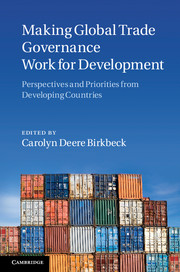 Making Global Trade Governance Work for Development
Making Global Trade Governance Work for Development Book contents
- Frontmatter
- Contents
- Figures
- Tables and boxes
- Contributors
- Acknowledgements
- Introduction
- Part I Global trade governance
- Part II Roles and responsibilities in global trade governance: diversity in developing country priorities and strategies
- 5 New powers in the club: the challenges of global trade governance
- 6 China’s ascent in global trade governance
- 7 LDC priorities for improved global trade governance
- 8 Priorities for small States in global trade governance
- 9 Improving the participation of small developing countries in the governance of the multilateral trading system
- Part III Strengthening multilateralism
- Part IV Making WTO negotiations and decision-making processes fairer
- Part V Conclusion
- Index
- References
7 - LDC priorities for improved global trade governance
from Part II - Roles and responsibilities in global trade governance: diversity in developing country priorities and strategies
Published online by Cambridge University Press: 07 September 2011
- Frontmatter
- Contents
- Figures
- Tables and boxes
- Contributors
- Acknowledgements
- Introduction
- Part I Global trade governance
- Part II Roles and responsibilities in global trade governance: diversity in developing country priorities and strategies
- 5 New powers in the club: the challenges of global trade governance
- 6 China’s ascent in global trade governance
- 7 LDC priorities for improved global trade governance
- 8 Priorities for small States in global trade governance
- 9 Improving the participation of small developing countries in the governance of the multilateral trading system
- Part III Strengthening multilateralism
- Part IV Making WTO negotiations and decision-making processes fairer
- Part V Conclusion
- Index
- References
Summary
Least developed countries (LDCs) are faced with a suite of challenges to their effective participation in global trade governance. Global trade governance includes bilateral, regional and multilateral trade agreements, and intergovernmental institutions like the World Trade Organization (WTO) and United Nations Conference on Trade and Development (UNCTAD). This chapter focuses on the multilateral trading system and specifically the WTO. It explores the emerging role of LDCs in WTO decision-making processes for negotiating the rules of the multilateral trading system and makes concrete proposals for advancing their priorities.
After a brief background on LDCs in WTO decision-making processes, this chapter reviews the historical role of developing countries in decision-making related to the General Agreement on Tariffs and Trade (GATT), the emergence of developing country coalitions in multilateral trade negotiations and the development of the LDC coalition in the WTO. It then sets out LDC priorities for improved global trade governance, emphasizing the role of Special and Differential Treatment (SDT) and the need for LDCs to take greater ownership of efforts to integrate them into the trading system. It continues by making the case for the creation of an institution for LDC-specific needs in Geneva. The chapter concludes with a summary of recommendations.
- Type
- Chapter
- Information
- Making Global Trade Governance Work for DevelopmentPerspectives and Priorities from Developing Countries, pp. 181 - 203Publisher: Cambridge University PressPrint publication year: 2011
References
- 1
- Cited by
